Do you ever wonder why you never see many revolving rifles?
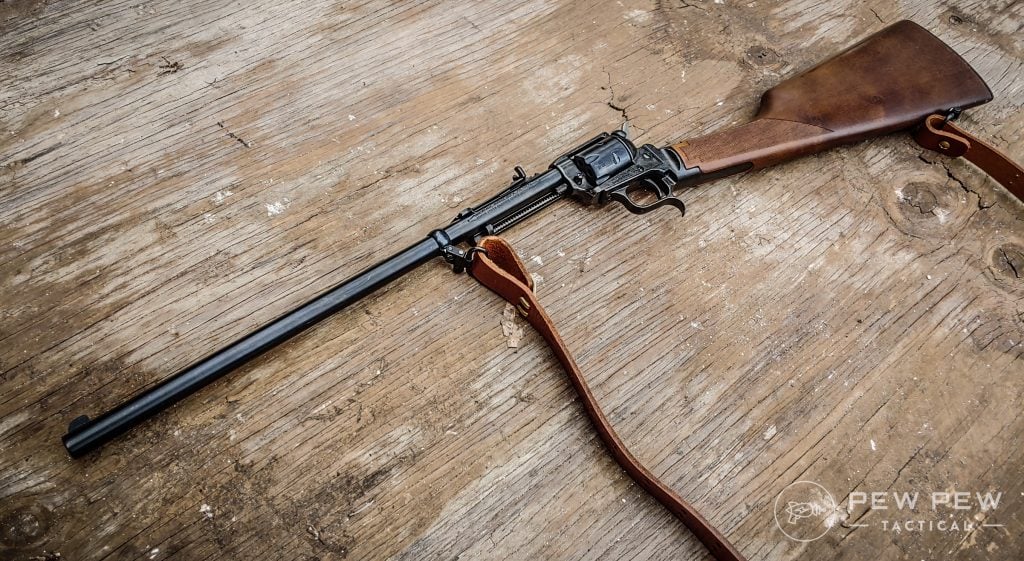
Revolving rifles seem to be a neat idea, especially in the days where single-shot muskets ruled, but revolvers were the sidearm of choice.
Why wouldn’t someone just extend the barrel, add a stock, and have a repeating rifle?
Remember, this was prior to cartridges…so the only real way to have a repeater was to have multiple cylinders.
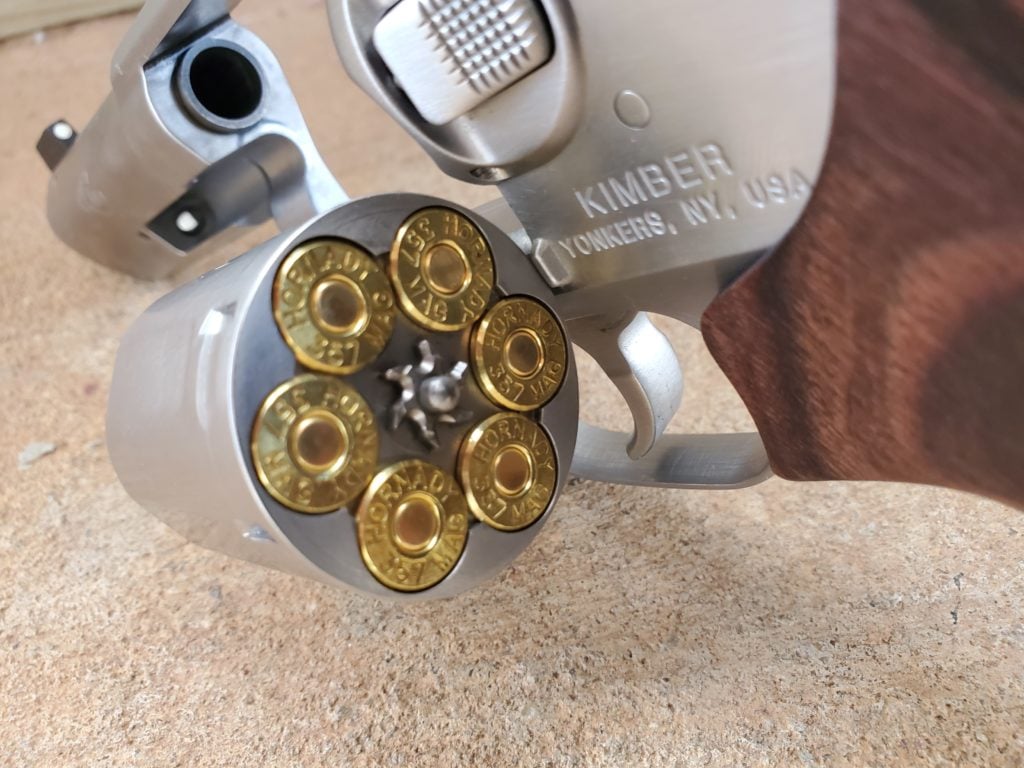
But in the modern era, why don’t we see many revolving rifles?
People love revolvers. PCCs are hugely popular. So why wouldn’t Smith and Wesson put out a .357 Magnum rifle with their famed revolver actions?
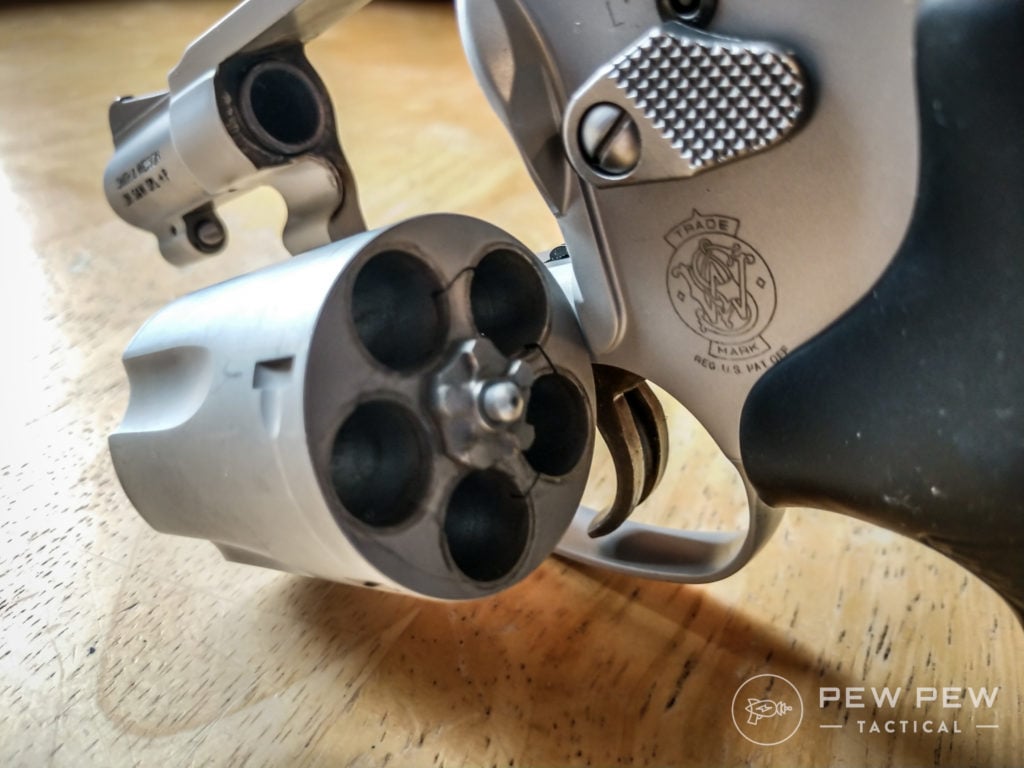
Welp, we intend to answer that question and more! We’ll cover the history behind revolving rifles and why you don’t see too many out on the range.
By the end, you’ll have a better understanding of these weird and wonderful weapons.
Table of Contents
Loading…
A Bit of History Behind the Revolver Rifle
People have been adding extra chambers to various long guns for quite some time — they go back to the 1500s, believe it or not.
The earliest example of what we consider a revolver and revolver rifle comes from Germany.
German Matchlock
German Matchlock guns had a single barrel and a revolving cylinder. They could hold up to eight rounds and the user had to manually rotate the cylinder to align it with the barrel.
These guns came in various configurations and sizes, including rifle variants.
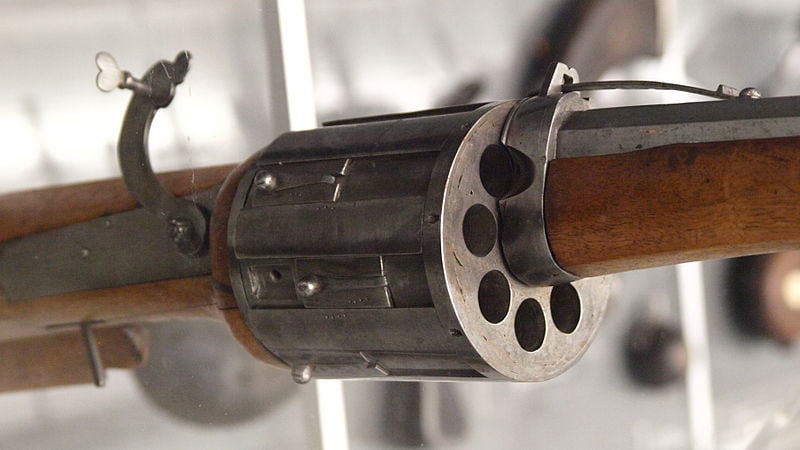
As you’d expect, they were a bit complicated for the time, expensive to manufacture, and likely difficult to use.
I imagine the exposed cylinders allowed the pre-loaded powers to be easily exposed to moisture, which would make the system unreliable.
Flintlock Revolving Rifles
Flintlock revolving rifles most certainly existed and were made in small batches by forward-thinking gunsmiths.
Elisha Collier held one of the earliest patents for a flintlock revolving action. He produced rifles, shotguns, and pistols using this action.
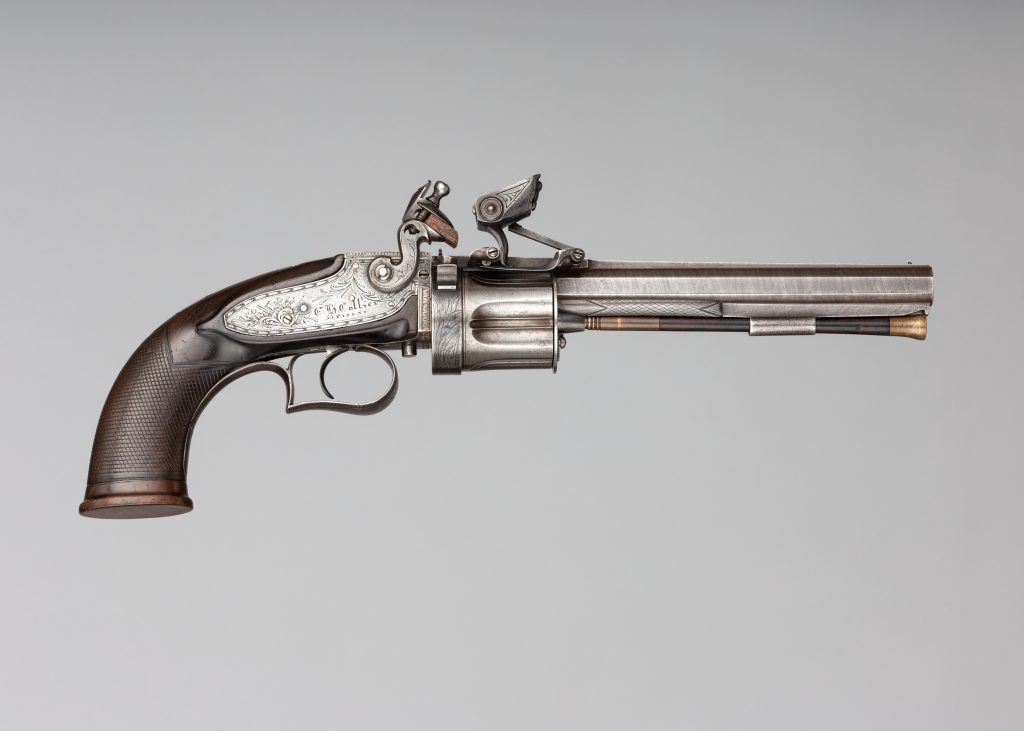
He wasn’t the only one doing so, though.
Flintlock revolver rifles were made around the world — some used Collier’s action, some didn’t.
Again, these proved expensive, and the flintlock action and black powder of the time didn’t help in the reliability department.
Alexander Hall Revolving Rifle
One percussion design worth mentioning was the Alexander Hall revolving rifle.

It’s a fair bit different than what we’d typically call a revolver.
While this rifle did feature a revolving cylinder and fixed barrel, the cylinder hung below most of the receiver.
But this .38 caliber rifle held 15 rounds in its cylinder! That’s a lot of ammo for 1858.
Colt Enters the Game
I was quite surprised to learn that Samuel Colt’s first firearm produced by Colt Patent Arms corporation was a revolving rifle in 1837. (Though this wasn’t Samuel Colt’s first gun design.)
Specifically, it was a ring-lever revolving rifle.
If you want to talk about an esoteric combination of devices and technology for the ages, this rifle has your number.
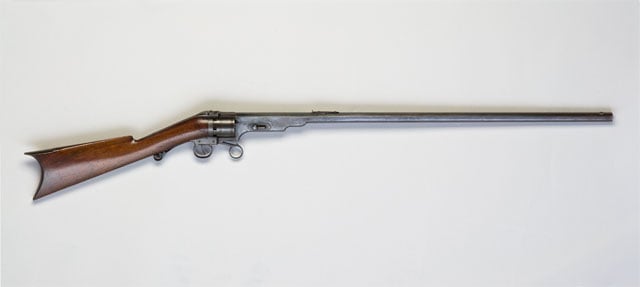
Ring lever systems are quite rare and function a bit differently than most lever guns.
The user inserts their finger into the ring and cocks it rearward. This rotates the cylinder and cocks the gun.
It lacked an exposed hammer, so the ring did all the work. The 32-inch barrel was quite long, but the eight-shot cylinder packed a lot of power for the time.
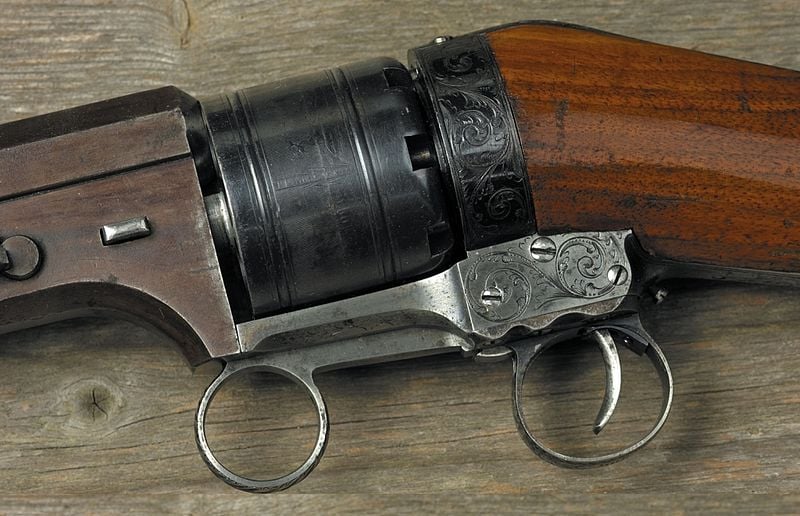
The Colt Ring Lever Rifle saw limited use with the U.S. Army in the Seminole Wars in Florida. Numerous improvements were made to create the Second Model of the Colt Ring Lever Rifle.
These revolving rifles were expensive, somewhat fragile, and often difficult to repair.
Colt New Model Revolving Rifle
On the eve of the Civil War, Colt began producing Army and Navy revolvers. They took the same design and turned it into a rifle and carbine variant called the Colt New Model Revolving Rifle.
The Pony Express men carried these New Model rifles on the most dangerous portion of their route.
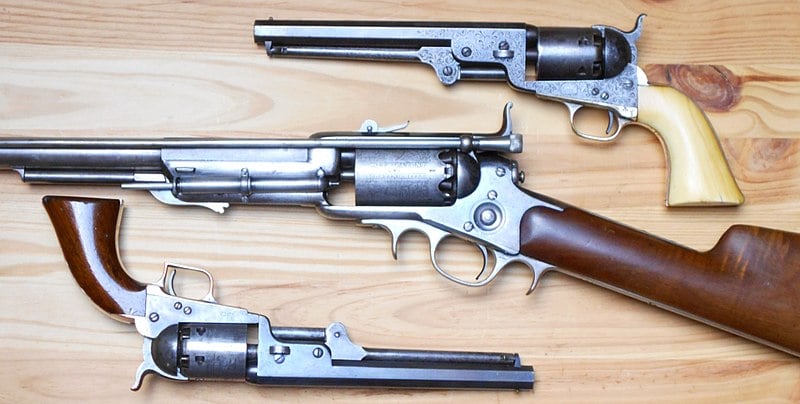
Colt also released stocks that fit onto their handguns and could form a carbine-style revolving rifle.
One famously even contained a pewter canteen.
In the quest to fight more efficiently, the Army purchased over 750 Colt New Model Revolving Rifles; however, most ended up in the Southern States.
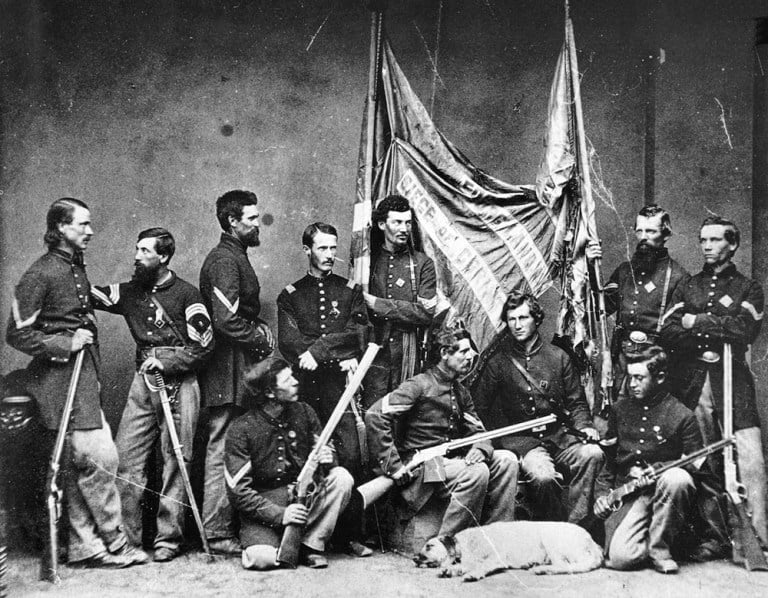
As the American Civil War kicked off, the Union Army purchased over 4,000 Colt New Model Revolving Rifles.
In service, they were loved and loathed.
They offered a repeating rifle that could fire five or six shots quite rapidly, and the Union troops proved they could be effective.
The Colt New Model Revolving rifles were the most successful revolving rifles, but even then, the Army didn’t keep them around for long.
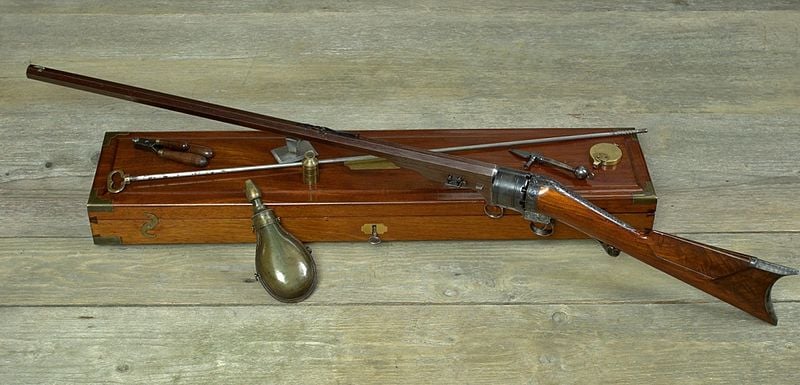
Metallic cartridges became the norm, and lever-action rifles quickly proved more efficient. They held more rounds, were simpler, and lacked the big problems that revolving rifles had.
Revolving rifles popped up every now and then in the modern cartridge era. Smith & Wesson made one, as did Remington…but they came and went but never caught on.

Not just because of lever guns, but because revolving rifles come with a few problems…
The Problem With Revolving Rifles
During the Civil War, the Colt New Model revolving rifles experienced an issue with chain firing all six cylinders on accident.
Sometimes loose powder wound up in odd places and when the weapon was fired…it would flash — one bang became six.

Metallic cartridges eliminate that issue, but they still have the cylinder gap problem.
Picture how you hold a rifle right now…a dominant hand to the rear and a non-dominant hand forward gripping the weapon.
Now picture a revolver and the location where the cylinder lies.
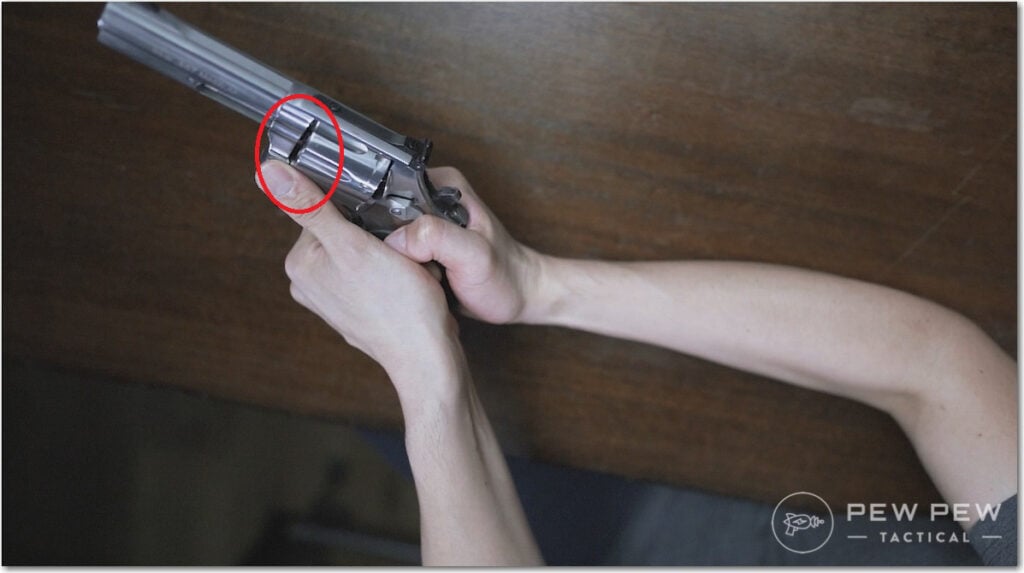
If you’ve ever fired a revolver, you know that the area between the barrel and cylinder exhibits some flash. That’s why a thumbs forward grip is often discouraged with wheel guns.
Now imagine gripping a revolver rifle.
The wrist and forearm of your non-dominant will be exposed to the flash and explosion.
Your arm will get peppered by lead shavings, unburnt powder, and you’ll also get a nice burn from the burning powder.
A leather long glove will help with modern cartridge guns, but outside of a knight’s gauntlet, not much will protect you from a chain-firing percussion pistol.
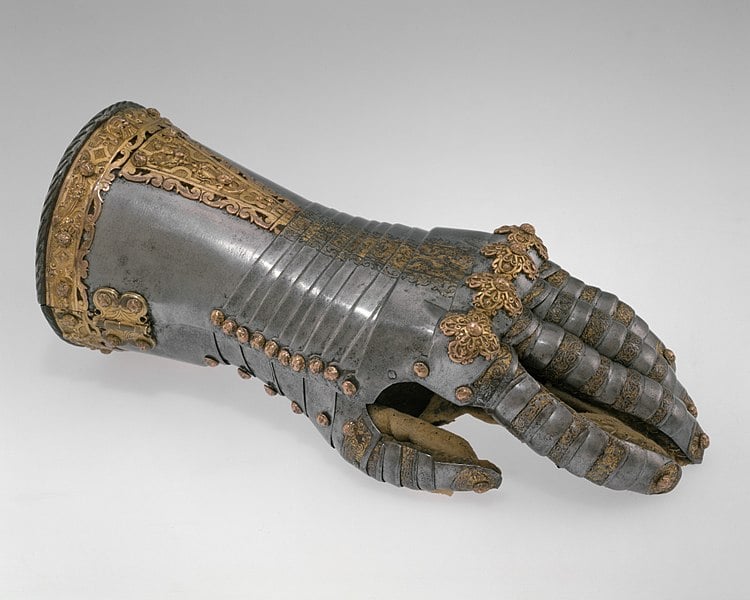
When it comes to cartridge guns, a revolving rifle is inefficient and downright silly.
Lever-action rifles offered a rapid-fire repeater that held more rounds without the need to mind cylinder blast.
Let’s be real…revolving rifles make about as much sense as lever-action pistols!
But it’s not all bad…some guns figured out a better system to make effective revolver rifles.
The aforementioned Pieper Revolving Carbine utilized a gas seal system like the Nagant revolvers. This eliminated the issue.

Some small American shops produced revolving shotguns that had cylinders enclosed entirely.
Unfortunately, it was too little too late.
The revolving rifle never took off, and these days it’s a novelty.
My Time Behind a Revolving Rifle
If you’re like me, you like weird stuff regardless of how efficient it is.
I like revolving rifles and think they are neat. When I saw the Heritage Arms Rancher carbine, I had to scoop it up.
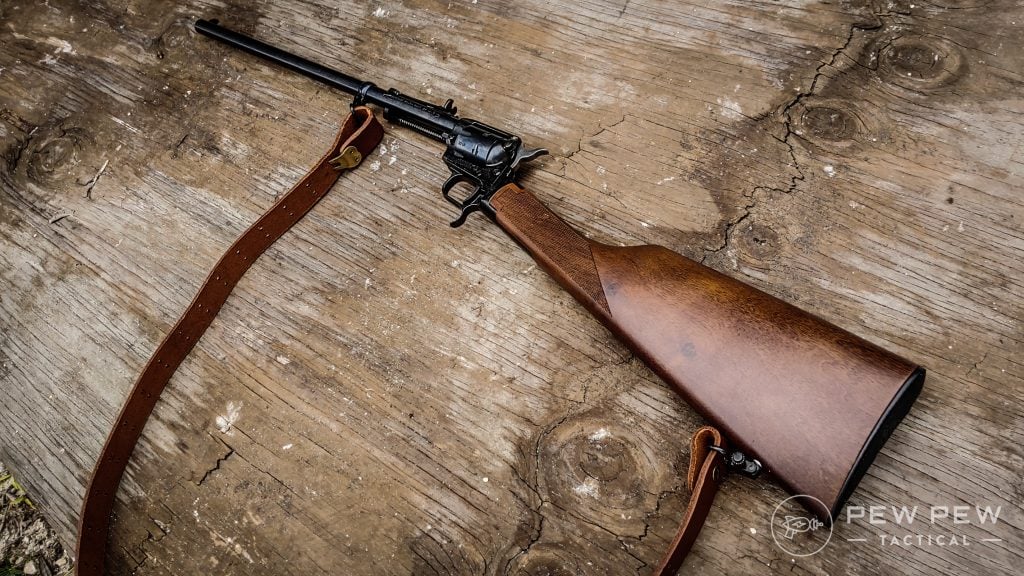
I like weird guns, but they have to be cheap!
The Heritage Arms Rancher popped up in my local gun store, and I snatched it up along with a brick of .22 LR.
Now that I’ve gone through that brick, I can see why the revolving rifle never took off.
That cylinder gap blast is very real!
Heritage includes instructions on how to fire the rifle. Basically, they say to do it with both hands behind the cylinder.
This position doesn’t feel natural, but it works because the Rancher is a .22 LR lightweight carbine. Anything in the heavyweight range would be a fun hassle.
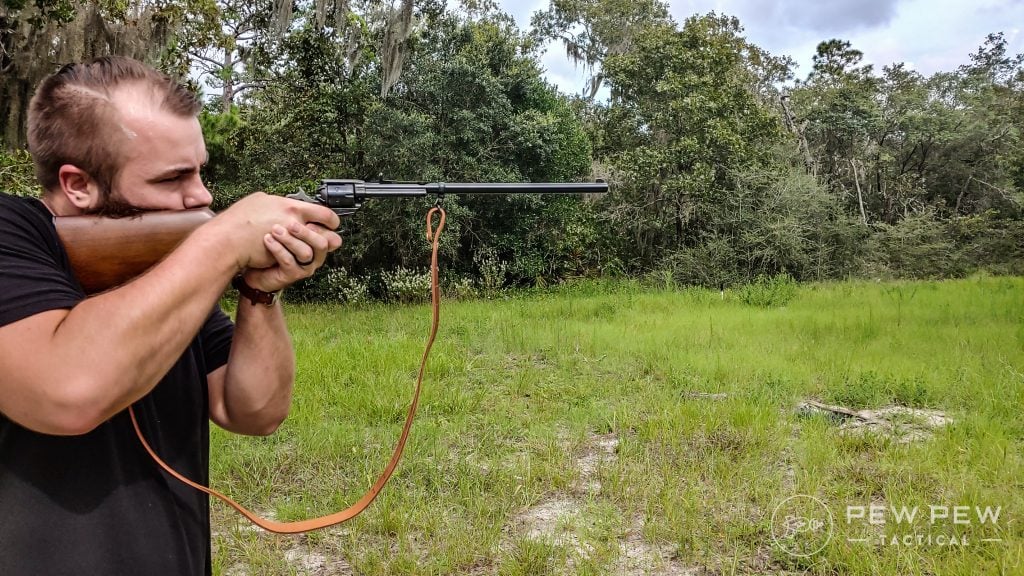
I, of course, had to try it the wrong way and hold the rifle like a rifle.
Even the little .22 LR had a burning cylinder gap, stung, and drew blood. It pricked me several times in the six rounds I fired and broke the skin in several places.
It’s not fun, my guys, and I don’t suggest it.

On top of the cylinder gap blast, I noticed you get a ton of gas in the face, as well as unburnt powder is thrown backward.
I felt several stings to the cheek as I fired my way through that brick.
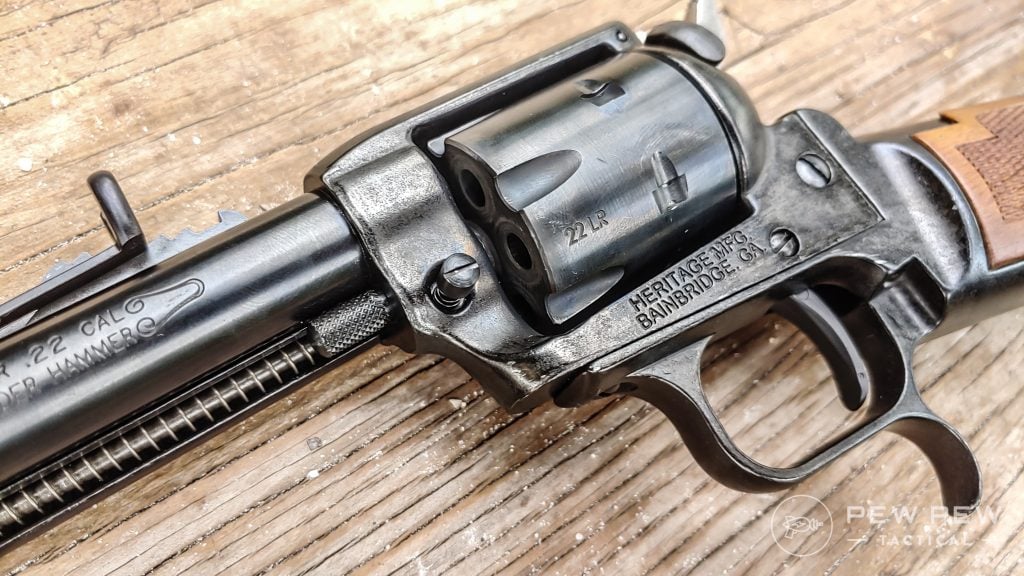
It’s also the loudest .22 LR rifle I’ve ever fired. It makes a standard Ruger 10/22 sound like it’s rocking a suppressor.
Don’t get me wrong, I love the little gun, but it’s not friendly to fire.
Even the .22 LR shows me that these are not comfortable guns, and something in .44 caliber utilizing black powder would be beyond uncomfortable.
Best Revolving Rifles
If you are looking for your own revolving rifle, then you have options.
Here are a few you oughta be able to find on the market.
1. Heritage Arms Rancher
As mentioned above, this revolving rifle takes the Heritage Arms Rough Rider and extends the barrel to 16-inches. It also tacks on a stock.
It’s the cheapest on the market and comes in at around $250.
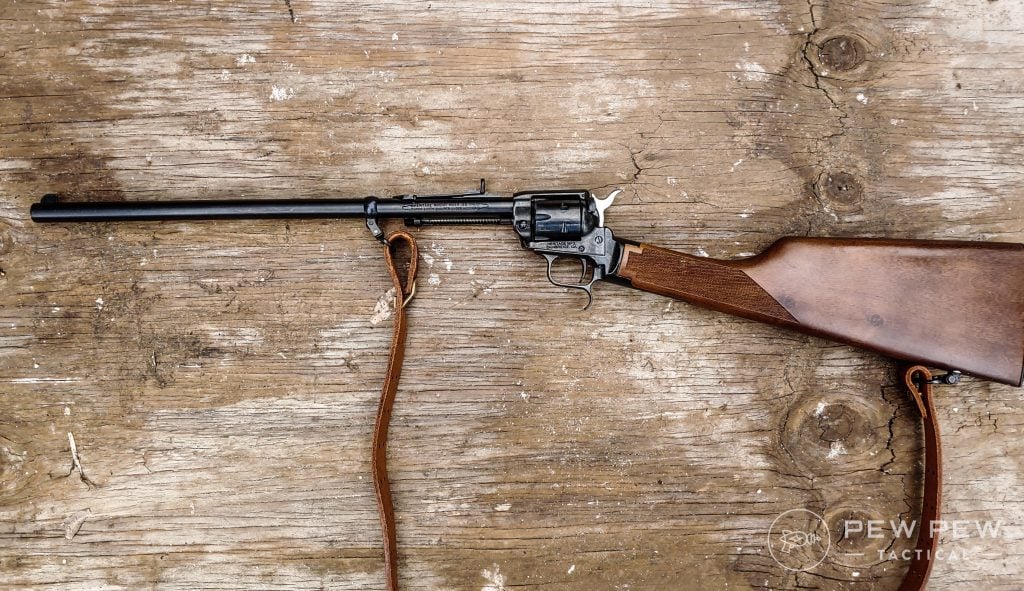
If you want the revolving rifle experience without breaking the bank, the Heritage Arms Rancher is the way to go.
It’s a really fun rifle, but wear your eye pro and watch your wrist. Oh, and if .22 LR isn’t enough, you can toss in a .22 Magnum cylinder and have at it.
Prices accurate at time of writing
Prices accurate at time of writing
-
25% off all OAKLEY products - OAKLEY25
Copied! Visit Merchant
2. Taurus-Rossi Circuit Judge
Sadly, I think Taurus and Rossi discontinued the Circuit Judge line, which is a real shame. However, they seem common enough on auction sites.
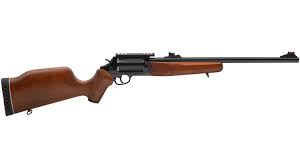
These were fun rifle/shotguns/rimfire guns. The standard model was super modern and chambered .410 and .45 Colt and built on the Judge frame.
They offered DA/SA trigger designs, modern sights, scope rails, and even rails for lights, lasers, and cup holders.
The coolest model to me was the Circuit Judge lever-action. This gun was a revolving rifle with a lever-action that rotated the cylinder and cocked the hammer.
Finally, they also released a rimfire model in .22 LR and .22 WMR. This gun offered optic compatibility, a DA/SA design, and a light rail.
Rossi-Taurus implemented a shield into the frame that blocked the blast from the cylinder. It was a ten-cent solution to a hundred-dollar problem.
3. Uberti Replicas
If you want a replica black powder gun, Uberti makes a Remington model 1858 carbine in .44.

It requires no FFL and gives you that Old West experience at a great price point. Uberti guns are from Italy but are absolutely fantastic.
Prices accurate at time of writing
Prices accurate at time of writing
-
25% off all OAKLEY products - OAKLEY25
Copied! Visit Merchant
For an old-school cartridge model, the Uberti 1873 Cattleman covers you with a .357 Magnum or .45 Colt rifle with a six-shot cylinder and SAA stylings.
These are surprisingly affordable, but take precautions not to burn yourself.
Prices accurate at time of writing
Prices accurate at time of writing
-
25% off all OAKLEY products - OAKLEY25
Copied! Visit Merchant
Conclusion
Revolving rifles are weird and wonderful but not super efficient or highly effective.

They provided an early source of repeating firearms but never excelled beyond that. Once metallic cartridges came to be, their days were numbered.
But they are a nice piece of nostalgia for those looking for some history.
What are your thoughts on revolving rifles? Let me know in the comments below. Want to continue down that old-school path? Check out the Best Lever-Actions You Can Still Buy Today.

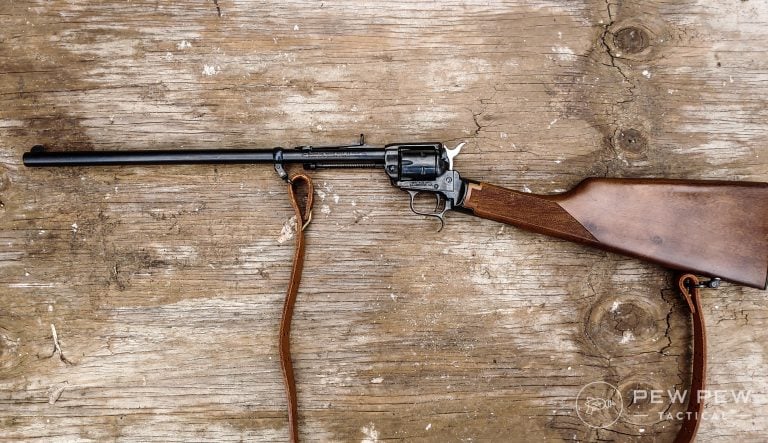










4 Leave a Reply
Johnathan Browning produced a revolver rifle as well as a slide action rifle before 1847. That's the year when the Church of Jesus Christ of Latter Day Saints started on their journey west. There are examples in Nauvoo, Illinois and Ogden, Utah. I have heard he was the inventor of the cylinder.
I just ordered an Uberti in .357.
Now I am wondering about how to carry it? Does anyone make a scabbard this shape?
Do the WWSD 2021 - it's something new.
Ah, yes, the WWSD 2021 - clearly the best revolving rifle to ever grace this Earth.